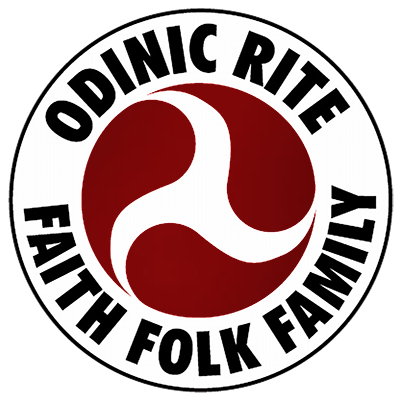Odinism and Philosophy
By Vidar AOR
First published in ORB 209, Summer 2258
Modern Odinism often lacks an in depth philosophical worldview, through no fault of our own of course, since our renewed faith hibernated for so many centuries. Searching for wisdom and truth, it is imperative that we learn the traditional branches of philosophy, make comparative studies where possible and work towards not only a stronger New Awakening, but a New Enlightenment as well. When it comes to heathen truth what is our true metaphysics? Ontology? Epistemology? Ethics? Metaethics? Logic? Aesthetics? Existentialism? And since ours is an indigenous organic faith, we can have, (once again), both science and spirituality.
It is my belief that only Odinism can fuse art and science, romance and reason, physics and theology, which monotheistic religions, philosophy and science have failed to accomplish.
I wish to introduce a concise overview of philosophy from the Classical era, Enlightenment era and Modern era as a vantage point towards theological growth. Beginning with Classical philosophy, which is to say Greek philosophy during the time span of 500 BCE to Common Era. The Greek philosophers can be described as pre-Christian heathens in the modern sense of the word despite their urban lifestyles. They had a polytheistic pantheon and religion with a mythology not altogether different from Odinism. The climate, wealth and stability of Greek life enabled several philosophic schools to develop with curriculums entailing religion, science and mathematics. The first Greek philosophers are known as the pre-Socratics (those that came before Socrates), with one of the most renowned being Pythagoras. Then came Socrates who taught Plato who in turn taught his pupil Aristotle (who interestingly enough taught Alexander the Great) and many other less popular figures. These were the first to write down their philosophical ideas, primarily into four main areas: Metaphysics; logic; ethics and physics (or science) . The word “philosophy” is Greek for “love of wisdom” and it becomes obvious to the general interest of Odinists.
With the coming of Christian monotheism, Greek philosophy came to an end; thus the dark ages began. It wouldn’t be until the early seventeenth century that philosophy would awaken again and free itself from the bonds of orthodox Christian doctrine. During the Dark, Medieval and Middle Ages, philosophy existed only as a chattel to the Christian theology in western civilization with only a few philosophers and mystics seeking to explore outside the normative belief system of those times.
With the imminent breakthrough of scientific discovery in the 1500’s, philosophy and liberal religion breathed a renewed whiff of cognitive air. This period of our history is known as “The Age of Enlightenment” or “ Age of Reason.” Enlightenment philosophers took up where the Greeks stopped. Many of these philosophers, especially the British, were scientists and mathematicians as well. A few proclaimed atheism, while another portion would claim “liberal Christianity”, while many more would coin themselves “Deists” to separate themselves from Judeo Christian mythology and adhered to the mechanistic view of theology (clockmaker god). In the Deistic view, God is not the god of the Bible but of nature and natural law that does not meddle with mankind but only observes the cosmic machinery. Despite contemporary Christians insistence that America is a “Christian Nation,” many of the Founding Fathers were in fact Deists, including Benjamin Franklin and Thomas Jefferson who inserted in the US Constitution, not Jesus Christ or Christian “God” but the “laws of Nature and Natures God.”
In the 1800’s philosophy evolved into further branches including Existentialism, Skepticism, Pragmatism and Aesthetics.
I write this essay to fellow Odinists, not to defend any one philosopher’s teachings in entirety or to apply modern Odinism to past philosophical eras. My intention is to basically introduce to those who may not be aware of them, simple definitions of the various fields of philosophy as a basic guide to building our own philosophic and theologic worldview as a way of sparking the Odinic force within you towards a higher understanding and metaphilosophy, what we need to get out of philosophy. To even summarize all of the philosophers and their teachings would take several books to write, many of which already exist.
Most modern writings and creeds of Odinism/Asatru lay in the two fields of philosophy, either ethics or metaphysics , (that is “acting” or what is often called “supernatural” i.e. our virtues and Gods), with lesser emphasis placed on Epistemology or “knowing”. Our noble nine virtues mostly deal with ethics, except for truth which falls within epistemology. These three main branches of philosophy can be remembered from the acronym BKA ; Being, Knowing, and Acting. The intent of this essay is to open doors of the other fields of philosophy to Odinists.
Metaphysics
This is the branch of philosophy that deals with what is often termed the supernatural and spirituality. It is often referred to as seeking “the nature of things” and this Greek word was coined by Aristotle in his treatise “metaphysika” which actually translates to “beyond the physical.”
Metaphysics studies the causation of life, cosmology and cosmogony, which in Odinism is found in the Prose Edda in the Gylfaginning and the Voluspa of the Poetic Edda (as well as some other texts). Metaphysics studies the organisation of reality in general and is used more specifically to describe whatever aspects of reality there may be that cannot be observed and measured, such as our Gods and demi-gods.
Ontology
Ontology is the study of being or existence. Ontologists want to know what we mean when we say something exists. Ontology argues for the existence of the Gods “a priori,” apart from observations in nature and natural law. How should we conceive our Gods instead of how we should perceive our sense of them?
Ethics
Much of modern Odinist material is ethical, dealing with the need for proper behaviour, morality and virtue. Being the most exoteric or obvious of all the philosophical fields, it is easy to see why most modern Odinists find its convenience appealing in reinstating a heroic reawakening. Ethicists ask “How should we behave?”
Nearly every religious creed lays down a set of ethical do’s and don’ts, or at least implies such as in Odinic mythology and in the sagas. The behaviour and roles that accompany them figure throughout the lore. The ethics of our Gods however, represent a deeper, esoteric area that transcends into the metaphysical realm. Much of the above is quite subjective as Odinism is not a universal, dogmatic faith. Any objective enquiry would recede into the field of “Metaethics,” the branch of philosophy that considers the objectivity of our judgments concerning moral obligation and intrinsic values. Ethics is commonly referred to as “normative ethics” and is primarily concerned with moral obligation and intrinsic value in human actions and character, exploring questions of moral intuitions, general principles, autonomy and ethical theories, religious authoritarianism, egoism, relativism, as well as deontology (duty based ethics) and teleology (i.e. consequentialism, utilitarianism ).
Epistemology
Epistemology deals with the theory or study of knowledge, how we have it, is it ‘a priori’ (by reason) or is it ‘a posteriori’ (by experience or observation), what is truth? Or do we even know anything at all ( Skepticism)?
During the age of Enlightenment our ancestors who studied philosophy split into two branches; the Empiricists, mainly in Britain and the Rationalists mostly in France and Germany. The former held ‘a priori’ knowledge while the latter defended their arguments ‘a posteriori’. How do our Gods and myths act as epistemic agents? Many of our Gods live and grow through experience (a posteriori). Others through reason (a priori). How can we learn from them and what does their supernatural wisdom and deeds imply to us as non supernaturals? How does our Odinic world view have an epistemic edge (as pro nature) on contemporary religions and science?
Logic
Logic is the branch of philosophy which analyzes the strength of arguments and argument forms. How valid is the Odinist argument against Christianity, Agnosticism and mainstream atheist belief or non – belief? Is the Odinist argument sound in all its premises? How compatible is Odinism with science?
Aesthetics
The philosophical examination of art and beauty lies in Aesthetics; whether beauty or quality exists, whether it is subjective or objective. What is art, poetry, music, cuisine etc etc? This is an area where I personally feel Odinism has a clear edge on monotheistic religions (some of which even forbid art). Our celebration of life, nature and diversity is a direct acknowledgment of beauty and stems from our myth and metaphysics. Compare Odinic aesthetic values with some of the contemporary (atheistic- materialist) “pop- culture” and mass – consumerism (quantity over quality), that often glorifies degenerate, democratic and universalist themes.
Odinism and other folkish movements today are aesthetic movements; revolutions in art, fashion, health, romance and music. Our aesthetic myths, skaldship, rituals, language and Gealdor all emanate from the folkish soul.
Existentialism
Existentialism is a more modern philosophical field centered on individual existence and personal responsibility for acts of freewill in the absence of certain knowledge of what is right and wrong. Often called the “philosophy of the absurd” and searches for meaning in existence, it began with the writings of Kierkegaard and evolved with the writings of Hegel, Nietzsche, Heidegger, Husserl and Sartre. Heavily subjective and individualistic, existentialism deals with purpose, intention and transcendence above mere “being”. In Odinism , existentialism exists within our hero construct of the Einherier (One Harriers) of becoming, Ragnarök and as a revolutionary creed towards a new morality.
Science
The study of science was a branch of philosophy and religion in antiquity, especially among the Greeks (notably Aristotle) until Judeo- Christianity set us in the Dark Ages. The ancients of Europe marvelled at the majesty of the natural world as evidence of the divine. To them, science, astronomy, astrology and mathematics were all religious disciplines. Will Odinism neutralise the dichotomy between science and spirituality once and for all? Will Odinism revitalize and save our Folk in this IT age through a renewed interest of science and math and logic via Odinic mythology? Can quantum physics unite Odinic myth to science and Odinism?
Some common issues in philosophy (and psychology) that should be of interest to Odinists are the “ “mind-body problem,” “free will/determinist problem,” the “problem of evil and suffering” (theodicy) and Existence of God.
The mind-body problem is an ontological question of a person’s mind or soul. Are minds just brains or are they non-physical minds (thoughts) or both? This implies a much larger question about spirit and matter; monotheism and polytheism, atheism and pantheism, hael or unhael dualism and the true meaning of metaphysics.
The free will problem deals with the question of determinism, libertarianism and subjectivism. Are our wills totally free, independent from what nature determines or partially determined by the Norns and Orlog? The free will problem is related to the mind-body problem. The use of natural law in Odinist argument is incomplete. What of human nature above animal instincts and basic natural law? Do different races have less of a free-will and independent thought? Are liberty and freedom the same? What is the role of will and consciousness in Odinism? Where do Odinists stand in the nature vs. nurture argument?
The problem of evil (or suffering) in philosophy often stems from a deistic or Christian theodicist perspective, that is how to reconcile the belief in the existence of a supreme being or beings with the amount of suffering that exists in the world. This brings the theological question of omnipotence and omniscience. The Desists of the seventeenth century accepted evil in Midgarth as necessary and our world as the “best of all possible worlds.” This acceptance of nature by the Deists broke a pillar in Christianity and monotheistic thought. In Odinic cosmogony, Odin hangs on Yggdrasil for nine nights in a state of suffering, yet becoming spiritually stronger, wiser and runically enlightened. The modern Odinic acceptance of suffering and the life-struggle is a welcome return to a healthy Folk-Soul and affirmation of life.
The existence of God or Gods and Goddesses or no God/s at all is still a heavy argument in modern philosophy and a touchy subject among Odinists who on the one hand believe in our Gods in an objective sense, as actual beings, and others who think our Gods are merely subjective states of “becoming”. This is the ontological argument for epistemic proof of the Divine ‘a priori,’ ‘a posteriori’ or both. Some modern Odinists avoid this argument altogether out of a fear of “recreating Christianity” or falling into an atheistic trap.
Folk building entails the inevitable development of a sounder philosophy than is generally available in present times and the ambiguous, narrow or shallow worldview existing in many heathen circles. I encourage all comrades to explore the worlds of philosophy, pick up where many of our fore folk left off yet from an Odinic perspective in pursuit of wisdom and compatible with the IT age we in in. Follow the Odic force and Thorric might for a New Awakening!
FAITH FOLK FAMILY
Sources
Double Richard, ed.1999 Beginning Philosophy, Oxford, Oxford University Press.
Pojman P Louis, ed 2003 Classics of Philosophy, Oxford, Oxford University Press


